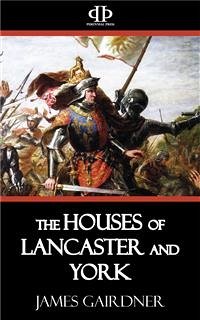The reign of Edward III may be considered the climax of mediaeval civilization and of England’s early greatness. It is the age in which chivalry attained its highest perfection. It is the period of the most brilliant achievements in war and of the greatest development of arts and commerce before the Reformation. It was succeeded by an age of decay and disorder, in the midst of which, for one brief interval, the glories of the days of King Edward were renewed; for the rest, all was sedition, anarchy, and civil war. Two different branches of the royal family set up rival pretensions to the throne; and the struggle, as it went on, engendered acts of violence and ferocity which destroyed all faith in the stability of government.
Even in Edward’s own days the tide had begun to turn. Of the lands he had won in France, and even of those he had inherited in that country, nearly all had been lost. Calais, Bordeaux, Bayonne and a few other places still remained; but Gascony had revolted, and a declaration of war had been received in England from Charles V, the son of that king of France who had been taken prisoner at Poitiers. Edward found it impossible in his declining years to maintain his old military renown. His illustrious son, the Black Prince, only tarnished his glory by the massacre of Limoges. Even if England had still possessed the warriors who had helped to win her earlier victories, success could not always be hoped for from that daring policy which had been wont to risk everything in a single battle. The French, too, had learned caution, and would no longer allow the issue to be so determined. They suffered John of Gaunt to march Through the very heart of their country from Calais to Bordeaux, only harassing his progress with petty skirmishes and leaving hunger to do its work upon the invading army. England was exhausted and had to be content with failure. During the last two years of Edward’s reign there was a truce, which expired three months before his death. But no attempt was made to do more than stand on the defensive...
Even in Edward’s own days the tide had begun to turn. Of the lands he had won in France, and even of those he had inherited in that country, nearly all had been lost. Calais, Bordeaux, Bayonne and a few other places still remained; but Gascony had revolted, and a declaration of war had been received in England from Charles V, the son of that king of France who had been taken prisoner at Poitiers. Edward found it impossible in his declining years to maintain his old military renown. His illustrious son, the Black Prince, only tarnished his glory by the massacre of Limoges. Even if England had still possessed the warriors who had helped to win her earlier victories, success could not always be hoped for from that daring policy which had been wont to risk everything in a single battle. The French, too, had learned caution, and would no longer allow the issue to be so determined. They suffered John of Gaunt to march Through the very heart of their country from Calais to Bordeaux, only harassing his progress with petty skirmishes and leaving hunger to do its work upon the invading army. England was exhausted and had to be content with failure. During the last two years of Edward’s reign there was a truce, which expired three months before his death. But no attempt was made to do more than stand on the defensive...









